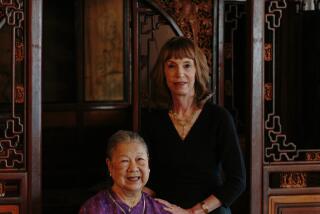‘Louisa May Alcott: The Woman Behind “Little Women” ’
- Share via
For those who know Louisa May Alcott only as the author of some of the most enduring classics of children’s literature, “Louisa May Alcott: The Woman Behind ‘Little Women’ ” will be a revelation. For those already familiar with Alcott’s Transcendentalist-boho childhood, her sensational tales of love and horror under the pen name A.M. Barnard and her refusal to diminish her personal and economic freedom by marrying, the dramatically reenacted documentary gives life and texture to a woman of extraordinary talent and determination who became as great a celebrity in her day as J.K. Rowling is in ours.
With Elizabeth Marvel as Alcott and Jane Alexander playing a family friend and early biographer, the film relies on the copious correspondence from the writer and her family, most notably her father, Bronson Alcott, with commentary from Alcott scholars including novelist Geraldine Brooks, who won the Pulitzer Prize for fiction in 2006 for “March,” a fictional imagining of what happened to Mr. March, the father of all those little women, during his stint as a minister in the Civil War.
Even if Alcott had not gone on to become an iconic writer, her life story would be a fascinating reflection of the major social, philosophical and political forces of her time. It’s not just that she was a lifelong “tomboy,” like the universally beloved Jo March, she was, almost literally, a product of the Transcendental movement.
Her beloved mother, Abigail, was a Boston aristocrat who was marrying beneath her when she chose the brilliant though itinerant Bronson, an early abolitionist and educational activist. For a while things went well, with Bronson running a school that became a model of progressive education and fastidiously documenting the lives of his young daughters. But when he allowed a black girl to attend, other parents withdrew, the school closed and the Alcotts began a life of perpetual poverty.
Living in Concord, Mass., and its environs, surrounded by family friends including Ralph Waldo Emerson and Henry David Thoreau, who would both become templates for characters in her adult stories, Louisa’s early years were rich with ideals -- at one point, the family lived on one of the many Utopian communities that dotted the area and followed a diet that consisted mostly of raw vegetables grown above ground -- but short on essentials.
And for all the talk of feminism and equality that filled the Alcott house, the burden of labor fell inevitably on the women: From an early age, Louisa was determined to lift her mother out of the life of drudgery that high-minded philosophies seemed to require. She did it with writing. Serving as a nurse during the Civil War, she quickly contracted typhoid fever. But if her nursing career was short, it was well documented. A series of articles were soon collected in “Hospital Sketches,” and Alcott found her career path.
For years, she wrote blood and thunder tales under the name A.M. Barnard, a double life that fooled the literary until fairly recently. An interview with the two sleuths who discovered the connection is one of the highlights of the film.
“Little Women” was actually an assignment, which soon led to an astonishingly prolific and successful career in children’s literature. Like Arthur Conan Doyle, Alcott chafed under the popularity of her characters and tales, but she was as pragmatic as she was fanciful. Soon she was a brand -- just the sight of her on a stage would cause audiences to applaud.
“The Woman Behind ‘Little Women,’ ” written by Harriet Reisen and directed by Nancy Porter, does a splendid job chronicling a woman who has served as an often hazy and romanticized role model. More than that, the film captures the intellectual foment of the time, which, though revolutionary in many ways, did not extend to a woman becoming a novelist or essayist under her own name unless she was writing for children.
Though one could argue that Alcott is one of the most influential Transcendentalists -- all of her children’s books include themes of social justice and responsibility, the importance of God and nature and a celebration of a life lived humbly -- she was not allowed to choose her own genre. Fortunately for us, perhaps, but one can’t help wondering what sort of legacy she would have left had she been allowed an even broader horizon.
More to Read
Only good movies
Get the Indie Focus newsletter, Mark Olsen's weekly guide to the world of cinema.
You may occasionally receive promotional content from the Los Angeles Times.










